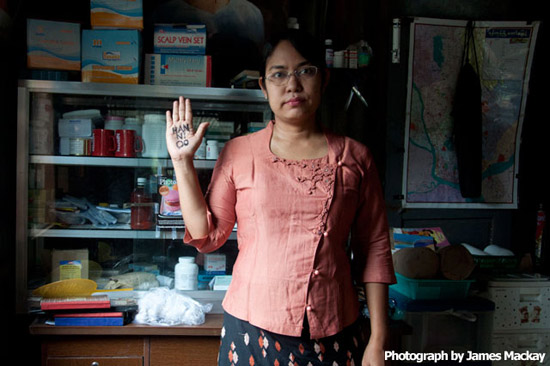Phyu Phy Thin, who has worked in an HIV/AIDS shelter programme in Rangoon for 10 years, knows what it’s like to be at the bottom end of Burma’s limited health care system.
 As the leader of one of the National League for Democracy’s (NLD) social-aid outreach programmes, she has worked with limited funds, struggling to provide up to 100 infected patients with medicine, food and shelter.
As the leader of one of the National League for Democracy’s (NLD) social-aid outreach programmes, she has worked with limited funds, struggling to provide up to 100 infected patients with medicine, food and shelter.
Soon, if she is elected to the Burmese Parliament as one of the NLD candidates, she can speak out through the voice of experience in calling attention to the needs of the have-nots in Burmese society, particularly AIDS patients who are often shunned and misunderstood. Last year, authorities in Burma threatened to shut down Phyu Phyu Thin's clinic in a suburb of Rangoon.
That Phyu Phyu Thin is dedicated is clear. In mid-January, Aung San Suu Kyi singled her out in a crowd while she was speaking in Rangoon's Mingalar Taung Nyunt Township.
“As you all know, Phyu Phyu not only possesses a desire to serve the people but also a proven capacity to do so,” said Suu Kyi. “I may not guarantee that all our candidates have such qualities. But I can guarantee that about Phyu Phyu.”
A story on the Voice of America (VOA) website on Monday, quoted Phyu Phyu Tin: “The most important issue now is that many children are infected with HIV, and we need to do provide them with support. Infection rates are rising among youths, so we need to increase social awareness.”
Phyu Phyu Thin is in the process of opening a second clinic to meet the growing need for care.
“Being a Myanmar [Burma] citizen, as well as an NLD member, I really do feel happy that Daw Suu is running. It's what we really need right now. I hope that we can all work together to build a modern, developed nation in the near future,” she told the VOA. “Since we have been under military dictatorship for such a long time, issues including education, health care need to be seriously addressed as soon as possible.”
It’s hard to grasp the significance of the recent changes in Burma, in which Phyu Phyu Thin, once harassed by the Burmese authorities, is now stepping up to run for Parliament.
In November last year, a Mizzima reporter accompanied Aung San Suu Kyi when she visited Phyu Phyu Thin’s shelter programme. The reporter heard Suu Kyi speaking to someone on the telephone: “Everybody has their own values so you don’t need to be discouraged. You must uplift your spirits and strength. I say these words not only to the patients but also to everybody … high and low status depends only on each person. Everybody needs to know that they can consider themselves a dignified person.”
Burma’s most prominent democracy leader gave each AIDS resident a rose, which they greatly appreciated.
“Ahmay [mother] Suu … told us not to be in low morale and said she would supply us with medicine. We are encouraged. All of the patients were very encouraged to see that another person, Daw Suu, is with us besides Ma Phyu [Phyu Phyu Thin] before … We hold these roses in very high esteem and shall keep them forever, even after they’ve dried up,” a 31-year old resident told Mizzima.
Phyu Phyu Thin said that new patients were always arriving at the centre.
“We can’t give medicine to new patients. NGOs first gave medicines to the patients and then stopped … when they didn’t have enough funding. So the availability of medicines for these patients is on and off. We still face medicine shortages,” Phyu Phyu Thin said in November.
There are more than 360,000 HIV patients in Burma. According to UN AIDS statistics, the junta’s Health Ministry spends about US$ 100,000 annually on its AIDS eradication campaign.
By contrast, neighbouring Thailand spent 4.9 billion baht (US$ 122.90 million) on HIV/AIDS treatment and programmes in 2004 (six years ago), a UN AIDS report said.



